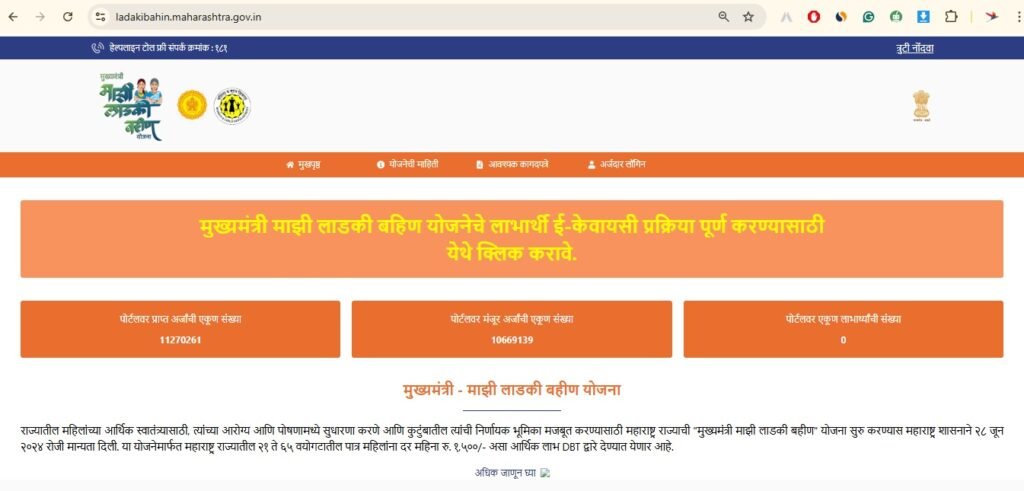In a landmark move to uplift women from economically weaker sections, the Maharashtra government has unveiled the Mukhyamantri Majhi Ladki Bahin Yojana, a welfare program that’s transforming lives with a direct monthly payout of Rs 1,500. Launched by the Women and Child Development Department, this initiative targets women aged 21 to 65, delivering funds straight to their Aadhaar-linked bank accounts via Direct Benefit Transfer (DBT). Far more than a financial aid scheme, it’s a powerful step toward fostering independence, enhancing health and nutrition, and amplifying women’s roles in household decision-making. With its seamless eKYC process and user-friendly online portal, accessing these benefits is easier than ever. This comprehensive guide dives into the scheme’s benefits, eligibility, step-by-step application process, and everything you need to join the millions already reaping its rewards.
What is the Ladki Bahin Yojana? A Vision for Women’s Empowerment
The Mukhyamantri Majhi Ladki Bahin Yojana is a cornerstone of Maharashtra’s commitment to gender equity and economic upliftment. Designed to support women from low-income households, it provides a steady monthly income of Rs 1,500, empowering recipients to address immediate needs like groceries, healthcare, or education while building a foundation for long-term stability. By leveraging the DBT system, the scheme ensures funds reach beneficiaries directly, eliminating intermediaries and reducing leakages—a model that’s already earning praise for its efficiency.
The program’s impact extends beyond wallets. Early reports indicate a surge in women’s confidence, with many investing in skill development, joining local cooperatives, or starting micro-businesses. In rural areas, where financial constraints often limit opportunities, this cash flow is sparking hope, enabling women to prioritize nutrition and preventive care. With over 1.5 crore women expected to benefit in its initial phase, the yojana is reshaping Maharashtra’s social and economic landscape, one empowered woman at a time.
Table: Mukhyamantri Majhi Ladki Bahin Yojana
| Category | Details |
|---|---|
| Scheme Name | Mukhyamantri Majhi Ladki Bahin Yojana |
| Objective | Financial support and empowerment of women from low-income families |
| Target Group | Women aged 21–65 in Maharashtra |
| Monthly Benefit | Rs 1,500 via bank transfer |
| Transfer Mode | Direct Benefit Transfer (DBT) |
| Eligibility | Maharashtra resident, income ≤ ₹2.5 lakh, Aadhaar-linked bank account, one woman per household, including widows/divorced/abandoned women |
| Exclusions | Families earning > ₹2.5 lakh, income tax payers, government/PSU employees, pensioners, MPs/MLAs, recipients of similar schemes, four-wheeler owners (except tractors) |
| Key Benefits | Supports daily needs, nutrition, healthcare, financial independence, skill-building, local economy boost |
| Application Process | Register on official portal, submit application, upload documents, track status online |
| Required Documents | Aadhaar card, photo, residence proof, marriage certificate (if applicable), bank passbook, self-declaration |
| Department | Women and Child Development Department, Maharashtra |
| Expected Reach | Over 1.5 crore women |
| Official Portal | ladakibahin.maharashtra.gov.in |
Key Benefits: Why This Scheme is a Game-Changer
The Ladki Bahin Yojana isn’t just about financial aid—it’s about creating ripple effects that transform lives. Here’s a breakdown of its standout benefits:
- Guaranteed Monthly Support: Every eligible woman receives Rs 1,500 monthly, offering a reliable safety net to cover essentials or invest in personal growth.
- Direct Bank Transfers: Funds are deposited into Aadhaar-linked accounts via DBT, ensuring transparency, speed, and zero corruption risks.
- Health and Nutrition Boost: The extra income enables better access to nutritious food and medical care, addressing Maharashtra’s challenges with maternal and child health.
- Empowering Decision-Making: With financial agency, women report stronger roles in family budgeting and planning, fostering gender equality at home.
- Economic Ripple Effects: Increased spending power stimulates local economies, as funds circulate through small businesses and markets.
These benefits collectively empower women to break free from financial dependency, making the scheme a catalyst for both individual and community growth. For many, it’s the difference between scraping by and dreaming big.
Who’s Eligible? Understanding the Criteria
The Ladki Bahin Yojana is designed to reach those who need it most, with clear and inclusive eligibility rules. To qualify, a woman must:
- Be a permanent resident of Maharashtra.
- Be aged between 21 and 65 years.
- Belong to a family with an annual income of Rs 2.5 lakh or less.
- Hold an active Aadhaar-linked bank account for DBT.
The scheme embraces diverse life circumstances, covering:
- Married women.
- Widows.
- Divorced women.
- Abandoned or destitute women.
- One unmarried woman per eligible household.
Even women in non-traditional roles, such as contract workers, outsourced staff, or volunteers, can apply if their income falls within the limit. This inclusive approach ensures that no deserving woman is left behind, particularly those in marginalized or vulnerable situations.
Who Cannot Apply? Key Exclusions to Know
To ensure fairness and prioritize the economically disadvantaged, the scheme outlines specific exclusions. Women are ineligible if:
- Their family’s annual income exceeds Rs 2.5 lakh.
- Any family member files income tax returns.
- A family member is a permanent or regular government employee, PSU worker, or pensioner.
- They already receive Rs 1,500 or more under another government scheme.
- A family member is a current or former MP/MLA or holds a senior position like Chairman or Director in government bodies.
- The family owns a four-wheeler (excluding tractors used for agricultural purposes).
These checks maintain the scheme’s focus on low-income households, ensuring resources aren’t diverted to those with alternative support systems. Applicants are encouraged to review these criteria carefully to avoid disqualification.
How to Complete eKYC: A Hassle-Free Guide to Secure Your Benefits
The eKYC process is the gateway to accessing the Ladki Bahin Yojana’s benefits, leveraging Aadhaar’s robust verification to ensure authenticity and prevent fraud. This digital-first approach makes it accessible even in remote areas, requiring just a smartphone or computer and a few minutes. Follow these steps to complete eKYC and apply:
Step 1: Register on the Official Portal
Visit the official Ladki Bahin Yojana portal at the official portal. Click “Applicant Login” and select “Create Account.” Enter your full name (matching your Aadhaar), mobile number, a strong password, and location details like district, taluka, and village or city. Agree to the terms, complete the captcha, and verify your mobile via OTP. Once verified, you’re ready to log in with your credentials.

Step 2: Submit Your Application
Log in using your registered mobile number and password. Select “Application for Mukhyamantri Majhi Ladki Bahin Yojana” from the dashboard. Fill in your Aadhaar number, personal details, bank account information, and address. Upload required documents (listed below) in clear, digital formats. Double-check for accuracy, then submit. You’ll receive an Application ID via SMS—save it for tracking purposes.
Step 3: Track Your Application Status
Return to the portal and log in. Navigate to “Applications Made Earlier” and enter your Application ID or use the auto-fill option. The portal displays real-time updates, from “Under Review” to “Approved” or any requests for additional documents. This transparency keeps you informed and in control, ensuring a smooth journey to approval.
Required Documents: Your Checklist for a Flawless Application
Applying for the Ladki Bahin Yojana requires a handful of documents, most of which are likely already at hand. Here’s what you’ll need:
- Recent Passport-Size Photo: A clear, recent image for identification.
- Aadhaar Card: Mandatory for eKYC and DBT.
- Domicile Proof: Options include a ration card, voter ID, birth certificate, or school leaving certificate to confirm Maharashtra residency.
- Husband’s Documents (if applicable): For women born outside Maharashtra, include your husband’s ration card, voter ID, or domicile certificate.
- Income Certificate: Not required for Yellow or Orange ration card holders, streamlining the process for many.
- Marriage Certificate: Essential for newlyweds not yet listed on family ration cards.
- Aadhaar-Linked Bank Account Details: Passbook or bank statement showing account number and IFSC code.
- Self-Declaration Letter: A simple affirmation of your details, as per the portal’s template.
Pro tip: Scan or photograph documents clearly and save them digitally before starting the application to avoid last-minute hiccups.
Why It Matters: The Bigger Picture of Ladki Bahin Yojana
The Ladki Bahin Yojana is more than a welfare program—it’s a movement toward a more equitable Maharashtra. By injecting Rs 1,500 monthly into the hands of women, it’s dismantling barriers of financial dependence and nurturing self-reliance. Beneficiaries are already reporting improved family nutrition, reduced stress over medical expenses, and greater confidence in household roles. In rural areas, the scheme is fueling small-scale enterprises, from tailoring to food stalls, creating a vibrant micro-economy.
The eKYC process, backed by Aadhaar’s secure framework, ensures that benefits reach only the intended recipients, setting a gold standard for transparency in welfare delivery. With millions of women poised to benefit, the yojana is a beacon of hope, proving that small, consistent support can yield monumental change. If you’re eligible, don’t wait—visit the official portal, complete your eKYC, and step into a future where financial empowerment is within reach.
(India CSR)



















